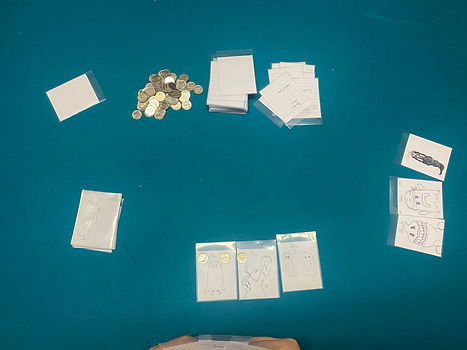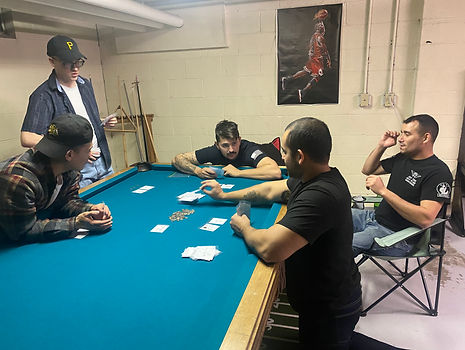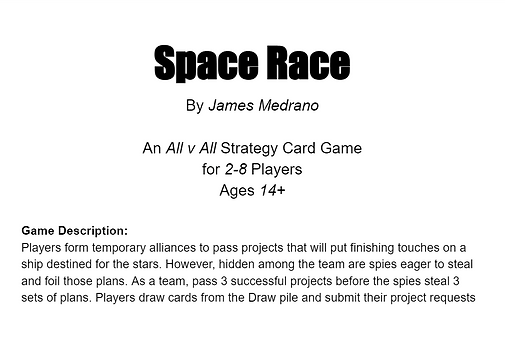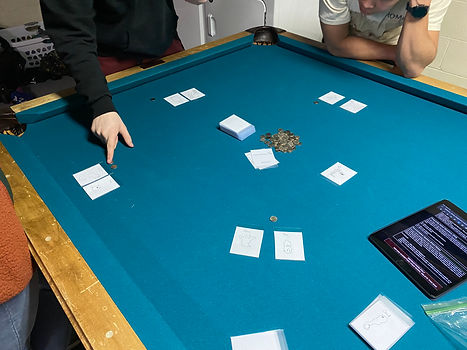
Pick Up Styx
An All vs All Strategy Card Game
Players race to ship their dearly departed souls to the After aboard the ferryman’s ship. Collect coins to pay the ferryman and be the first player to send all your spirits to the After, but beware! The ferryman has limited space and other players may have a dirty trick or two up their sleeve!
Created during Intro to Game Design (October-November 2021)
Project Goals
-
Create the initial design for a Strategy Card Game
-
Fill out initial GRATIS (Goals, Rules, Actions, Transitions, Items, Setup)
-
Identify the Meaningful Choices present in game
-
Conduct 2 Single Player Playtests (self tests)
-
Document playtest findings (Playtest 1 and 2)
-
Develop a Flowchart for the game
-
Playtest the game with a group of people (including self)
-
Document your playtest findings (Playtest 3)
-
Develop a Rulebook and document rule updates
-
Develop a Quick Reference (Cheat Sheet)
-
Observe 3 Group Playtests (not including self)
-
Document playtest findings (Playtest 4, 5 and 6)
-
Complete Final Reflections
Restrictions
-
Play time must be 5-20 minutes
-
Game must avoid Gang Up Behavior (Continually skipping, knocking out, or ganging up on a particular player resulting in one or more player's being unable to play for extended periods of time)
-
Game must not require a physical game board
-
Game must not be designed as a Trading Card Game (e.g. Yu-Gi-Oh!, Pokémon or Magic the Gathering)
-
Game must not be designed as a Party Game (Games where the rules do not define how player(s) win the round. Instead it is left up to the players to determine the winner based on how they feel)
-
Simple Repurpose of 52-Card Deck or Re-Skin of an already existing game
What Went Right
Avoiding Stalemates

During early iterations of the game, players could never win. There were too many cards that caused players to gain another soul or prevent their souls from being scored. To mitigate this, I reduced the number of cards in a player's hand from 5 to 3, removed several cards that gave players another soul or blocked a soul from being scored, and reduced the number of soul cards a player started with from 5 to 3. These changes not only allowed the game to reach an end, but also presented players with more meaningful decisions like choosing to discard a card that prevents an opponent from in favor of flipping the ferryman early.
Tense Finishes
After many iterations, and continuous improvement from player feedback, the final iteration of the game received a lot of praise from play testers. Players took on a variety of strategies, from forming temporary alliances and attempting to convince others to side with them to playing completely offensively and rushing to get their souls scored as fast as possible. However, no one strategy seemed to dominate another, and every game came down to two, sometimes three, players vying for the win.

Cohesive Flowchart

This project was my introduction to using a flowchart to map out how a game should progress from set-up to finish. Initially, I had some trouble trying to map out how turns and rounds progressed, as the ferryman changes when he is flipped which determines when a round starts, but I came up with this flowchart that captures the flow perfectly. Additionally, in the case that a card is played that causes the ferryman to be flipped early the flowchart doesn't fall apart or become obsolete. I would highly recommend anyone designing a card game or a board game take the time to develop a flowchart, it does a great job explaining exactly how a game should progress.
What Went Wrong
Limited Play Testers

I didn't have access to a wide variety of play testers for this project unfortunately. I did have one or two new players come in for every session, but the group of play testers for was widely the same. I still took feedback and implemented changes based on it but presenting my card game to complete strangers at my local comic book shop could've given me a wider range of perspectives and improvements. Also, a friend group typically wants to see another friend succeed so they tend to curb their criticisms.
K.I.S.S.
During the brainstorming phase, I had an idea for a deception card game that was based on Secret Hitler. One player would act as the head scientist and one would act as the project manager, while everyone else placed cards in a pile to be submitted. The project manager would select two of the cards to pass on to the head scientist and they would have to decide which card to play, if they passed three sabotages the spy/spies would win, if they passed three successful projects the scientists would win. I pitched the idea to my wife, but it began to get convoluted. I decided to scrap the idea in favor of something more straightforward. As the old adage goes, keep it simple stupid.

"It's like Monopoly"

During an early play test, one of the play testers made the comment, "It's like Monopoly," while referring to gathering tokens and reaching a win condition. This comment, while not malicious in any way, struck a chord for me because it was everything I was trying to avoid. I didn't want to make a game that players felt trapped in, wondering when someone was going to win. I reviewed what was causing games to drag on which ultimately resulted in scrapping cards and changing how turns commenced. I felt like I had been sent straight to jail while I was looking for Free Parking.
Conclusion
Overall, this project was a great learning experience. I utilized a Game Design Document for the first time, which allowed me to record my findings and address problem areas. This was also my first experience creating a game, which I had a lot of fun with, each iteration changed the way the game was played and observing how it evolved from concept to (temporary) final product was an amazing journey. I learned how to focus on balancing and creating meaningful choices to produce a game that my friends still ask about.
Project Photos

Players had 5 cards in their hand and 3 souls to score, but relied on cards to gain coins.

Overhead view of cards. Both players have souls waiting to be scored.

Flowchart for final iteration of Pick Up Styx.

Players had 5 cards in their hand and 3 souls to score, but relied on cards to gain coins.



